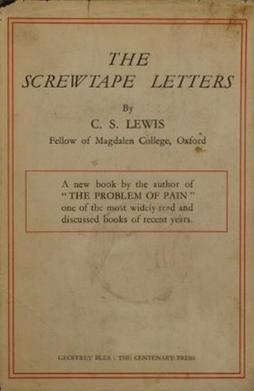The Screwtape Letters is a novel by the British author C. S. Lewis, first published in 1942. Written in epistolarity styleNovel written in the form of a series of letters., it takes the form of a series of thirty-one letters from a senior demon, Screwtape, to his nephew Wormwood, a junior tempter, who has been tasked with securing the damnation of a British man known only as the patient, by guiding him towards “Our Father Below”, Satan, and away from the “Enemy”, God.
The book is not written as a Christian theological defence of the literal reading of Biblical demons, but uses them to explore Christianity from the Devil’s point of view.[1] In his preface Lewis remarks that there are two errors humans can fall into with regard to devils: the first is is not to believe in them, and the second is to become obsessed by them, either of which outcomes please the demons equally.[2]
Synopsis
In his opening letter to his nephew, Screwtape warns against believing that rational argument will persuade the patient, as it will simply awaken the patient’s reason, with unforeseen consequences. Instead he advises the use of jargon, which the press and other media has already accustomed the patient to. In the second letter it is revealed that the patient has converted to Christianity, for which Screwtape warns that his nephew will not “escape the usual penalties”. But he also points Wormwood towards one of their great allies, the Church itself:
As the plot develops, a striking contrast forms between Wormwood and Screwtape. Wormwood is depicted as being anxious to tempt his patient into extravagantly wicked and deplorable sins, often recklessly, while Screwtape advises a more subtle approach. In Letter XII Screwtape remarks that “the safest road to hell is the gradual one – the gentle slope, soft underfoot, without sudden turnings, without milestones, without signposts.”[4]
In Letter XXII, after several failed attempts to find a licentious woman for the patient “to promote a useful marriage,” and after Screwtape narrowly avoids a painful punishment for having divulged to Wormwood God’s genuine love for humanity – about which Wormwood had promptly informed the Infernal authorities – Screwtape notes that the patient has fallen in love with a Christian girl, and through her and her family has adopted a very Christian way of life.
The final letter reveals that the patient has been killed during the Second World War blitz, and has gone to Heaven. For his ultimate failure in letting a soul slip through his fingers, Wormwood is given to Screwtape to be consumed. In his final letter Screwtape describes his nephew as “as dainty a morsel as ever I grew fat on”,[5] ending with “Your increasingly and ravenously affectionate uncle”.[6]
Sequel
Lewis wrote a short sequel to the The Screwtape Letters, first published as an article in The Saturday Evening Post in 1959, “Screwtape Proposes a Toast”.[7] It takes the form of an after-dinner speech given in Hell by Screwtape, to the graduating class of demons at the Tempters’ Training College.
See also
- List of works by C. S. Lewis
List of the works written by C. S. Lewis (1898–1963), best-known for his Chronicles of Narnia series of books.



